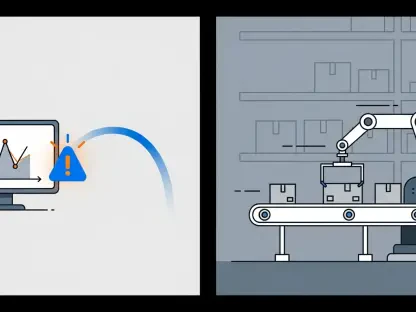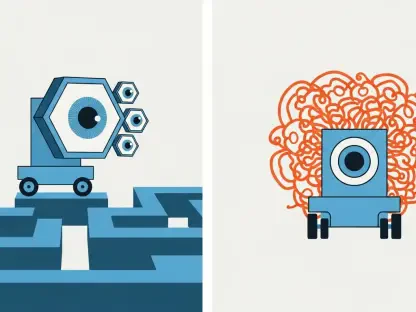Over the past few years, technology has increasingly permeated various sectors, and healthcare is no exception. The advent of generative AI tools like ChatGPT is showcasing significant potential to revolutionize medical practices. A recent survey by Uppsala University, in collaboration with Harvard Medical School and the University of Basel, reveals that a notable percentage of General Practitioners (GPs) in the United Kingdom are adopting these AI tools in their clinical workflows. Conducted in February 2024, the study surveyed 1,006 GPs registered with Doctors.net.uk, the UK’s largest professional network for doctors. Findings from this survey highlight the progressive integration of AI in healthcare and its reverberating impacts on patient care and medical administration.
Increasing Adoption of AI in Clinical Settings
The results of the study indicate that 20% of UK GPs are currently utilizing generative AI tools, with ChatGPT standing out as the most frequently employed AI in clinical settings. This rapid adoption underscores a significant shift towards the reliance on advanced technologies for improving medical practice efficiency. AI tools have transcended from being futuristic concepts to everyday utilities in medical practices. The trend is not only reflective of the increasing comfort levels of practitioners with technology but also their recognition of its benefits. By integrating tools like ChatGPT, GPs are experiencing tangible improvements in their workflows, an aspect highly emphasized by the practitioners involved in the survey.
The data indicates that the integration of AI tools is not merely about embracing new technology but also about substantively enhancing the quality of healthcare delivery. With 20% of GPs already using generative AI tools, the landscape of medical practice is undergoing a transformation that could set the precedent for other healthcare systems worldwide. This shift towards digitalization is expected to bring long-lasting changes to how medical practices operate in both clinical and administrative contexts. The essential role that AI is playing in these changes points toward a future where technology and medicine work hand-in-hand to provide better patient outcomes and more efficient practices.
Usage Patterns and Applications
A significant portion of the surveyed GPs, approximately 29%, use AI to generate documentation after patient appointments. This application is vital in reducing the administrative burden that often consumes valuable time and resources. By automating documentation, GPs can focus more on patient care, enhancing the overall efficiency of their practice. This use case alone highlights the practical benefits that AI can bring to healthcare, turning tedious and time-consuming tasks into streamlined processes. The efficiency gains from such applications are seen as a major advantage, particularly in busy clinical settings where time is of the essence.
Moreover, another 28% of GPs are leveraging AI for assisting with differential diagnosis. This use case is particularly noteworthy as it demonstrates AI’s role in supporting critical decision-making processes. Generative AI tools, with their capacity to provide updated medical information and analyze patient history, are proving indispensable in diagnosing ailments and formulating treatment plans. By offering a second opinion or validating the doctor’s initial diagnosis, AI can significantly enhance the accuracy and reliability of medical assessments. This capability is transforming the consultative process, making it more data-driven and evidence-based, which is crucial for achieving better patient outcomes.
Ethical and Practical Considerations
While the benefits of AI tools are clear, the integration of these technologies in healthcare is not without challenges. Dr. Charlotte Blease—the lead researcher of the study—stresses the ethical and practical implications that come with the use of AI in medical settings. The tools must be utilized correctly to avoid risks such as the generation of harmful advice. Despite their potential, AI tools can pose significant risks if not properly managed. The lack of formal training and guidelines is a major concern. To mitigate these risks, it is imperative that comprehensive training programs and robust regulatory frameworks are established. Proper training ensures that GPs can effectively harness the capabilities of AI while safeguarding patient welfare.
Furthermore, the ethical considerations extend beyond just the correct usage of AI tools. Issues related to data privacy, algorithmic bias, and patient consent are equally important. The deployment of AI in healthcare must adhere to strict ethical standards that prioritize patient rights and ensure equity in medical treatment. The complexity of these considerations is a reminder that while AI has the potential to revolutionize healthcare, its implementation must be approached with caution and responsibility. Balancing technological advancements with ethical considerations will be key in achieving the full potential of AI in medicine.
Consensus and Divergence in Opinions
The study reveals a general consensus among GPs on the value of AI-powered tools, reflecting an overarching trend toward digitalization in healthcare. However, opinions diverge on the readiness of the medical community to fully embrace these technologies. The apparent gaps in formal training and regulatory guidance are critical issues that need urgent attention. While many doctors are enthusiastic about the potential of AI to transform medical practices, others express caution. This cautious optimism underscores the complexity of integrating advanced technologies into healthcare. The need for clear guidelines and training programs is paramount to build confidence and ensure the safe use of AI tools.
The divergence in opinions indicates that the road to full AI integration in healthcare is not straightforward. There are varying levels of comfort and readiness among practitioners, depending on their familiarity with technology and the specific needs of their practice. Addressing these discrepancies will require a concerted effort from both the medical community and regulatory bodies. Creating a uniform standard for AI implementation, coupled with ongoing training and support, can help bridge the gap and foster a more cohesive approach to AI adoption in healthcare.
Nuanced Perspectives on AI Tools
The diverse perspectives within the medical community add nuance to the discussion on AI integration. Many GPs are optimistic about the efficiency gains and decision-support capabilities provided by tools like ChatGPT. However, there is a shared sense of caution regarding the ethical implications and the need for appropriate safeguards. The narrative surrounding AI in healthcare is multifaceted. While the potential benefits are significant, the risks cannot be overlooked. It is this balanced understanding that will drive the future discourse on AI’s role in healthcare. The emphasis on ethical use and patient safety is essential to navigate the complex landscape of AI integration.
The discussion on AI tools is further enriched by the experiences of early adopters, who provide valuable insights into the practical challenges and successes of using AI in clinical settings. Their firsthand accounts serve as a guide for other practitioners contemplating the adoption of AI, highlighting both the rewards and the pitfalls. As more GPs share their experiences, a clearer picture of AI’s impact on medical practice will emerge, informing future developments and regulatory measures. This collective learning process is crucial for ensuring that AI tools are used in a manner that benefits both practitioners and patients.
Future Directions and Recommendations
In recent years, technology has begun to play an increasingly pivotal role in various sectors, and healthcare is a prime example. The introduction of generative AI tools, such as ChatGPT, is revealing vast potential to transform medical practices. A recent study conducted by Uppsala University, in partnership with Harvard Medical School and the University of Basel, indicates a significant shift among General Practitioners (GPs) in the United Kingdom towards incorporating these AI tools into their clinical workflows. This survey was carried out in February 2024 and included 1,006 GPs who are part of Doctors.net.uk, the UK’s largest professional network for doctors. The results of the survey underscore the growing integration of AI in healthcare, highlighting its profound impacts on patient care and medical administration. This progressive movement towards AI adoption reflects an accelerating trend that has the potential to enhance diagnostic accuracy, streamline administrative tasks, and ultimately improve the quality of patient care. As AI continues to evolve, its role in healthcare is expected to become even more integral.









